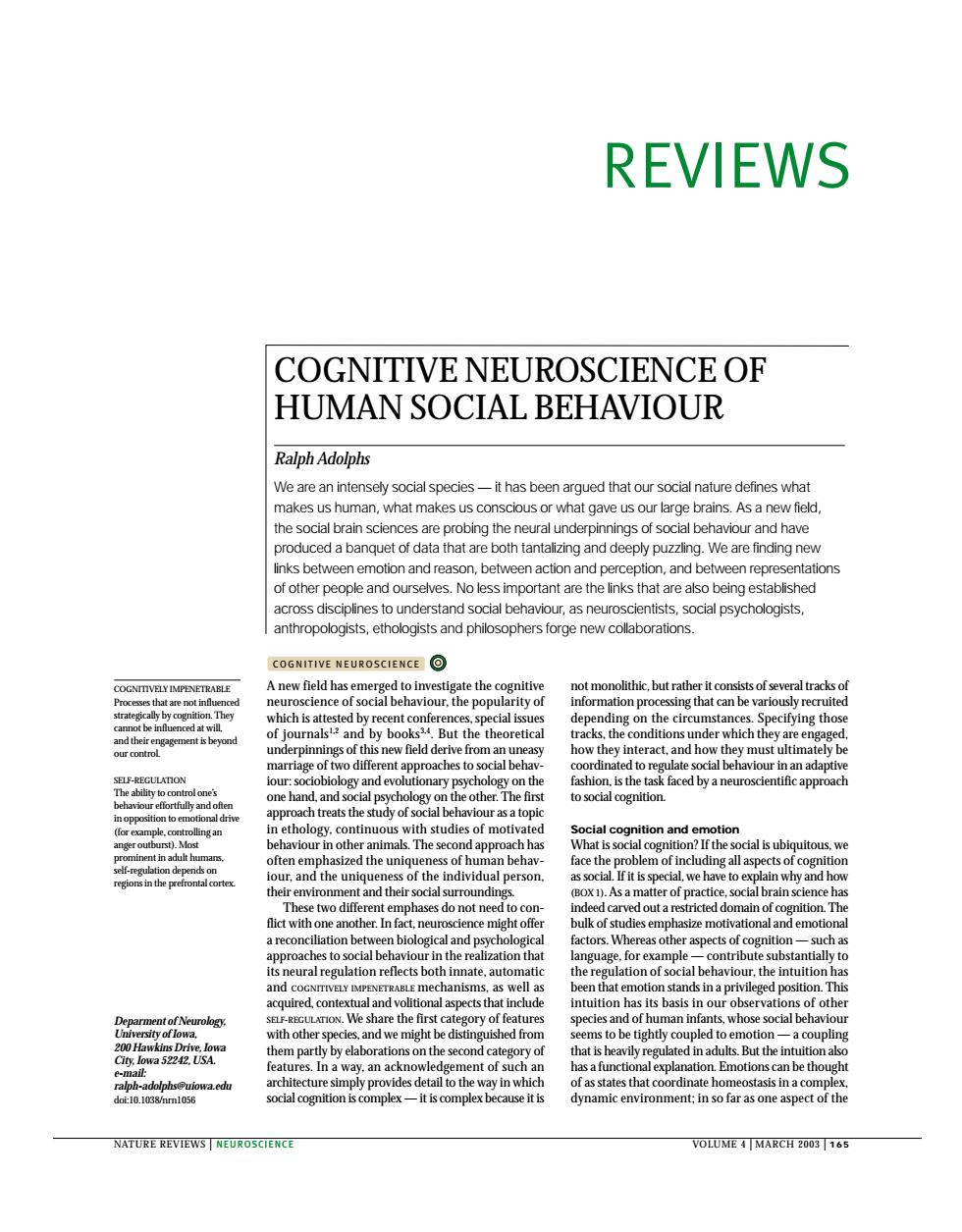正在加载图片...

REVIEWS COGNITIVE NEUROSCIENCE OF HUMAN SOCIAL BEHAVIOUR Ralph Adolphs We are an intensely social species-it has been arqued that our social nature defines what makes us human,what makes us conscious or what gave us our large brains.As a new field. the social brain sciences are probing the neural underpinnings of social behaviour and have roduced a banquet of data that are both tantalizing and deeply puzzlng.We are finding new nmotion and reason,berveen actn and percepion andbets ner peo 0G NEUROSCIENCE But the包ls an ada gy and evol other:The fr ed by a neur app with studies of r s of hu an beha of ind dpy0 .th e secon that nate oa NATURE REVIEWS NEUROSCIENC VOLUME 4 MARCH 200315REVIEWS A new field has emerged to investigate the cognitive neuroscience of social behaviour, the popularity of which is attested by recent conferences, special issues of journals1,2 and by books3,4. But the theoretical underpinnings of this new field derive from an uneasy marriage of two different approaches to social behaviour: sociobiology and evolutionary psychology on the one hand, and social psychology on the other. The first approach treats the study of social behaviour as a topic in ethology, continuous with studies of motivated behaviour in other animals. The second approach has often emphasized the uniqueness of human behaviour, and the uniqueness of the individual person, their environment and their social surroundings. These two different emphases do not need to conflict with one another. In fact, neuroscience might offer a reconciliation between biological and psychological approaches to social behaviour in the realization that its neural regulation reflects both innate, automatic and COGNITIVELY IMPENETRABLE mechanisms, as well as acquired, contextual and volitional aspects that include SELF-REGULATION. We share the first category of features with other species, and we might be distinguished from them partly by elaborations on the second category of features. In a way, an acknowledgement of such an architecture simply provides detail to the way in which social cognition is complex — it is complex because it is not monolithic, but rather it consists of several tracks of information processing that can be variously recruited depending on the circumstances. Specifying those tracks, the conditions under which they are engaged, how they interact, and how they must ultimately be coordinated to regulate social behaviour in an adaptive fashion, is the task faced by a neuroscientific approach to social cognition. Social cognition and emotion What is social cognition? If the social is ubiquitous, we face the problem of including all aspects of cognition as social. If it is special, we have to explain why and how (BOX 1). As a matter of practice, social brain science has indeed carved out a restricted domain of cognition. The bulk of studies emphasize motivational and emotional factors. Whereas other aspects of cognition — such as language, for example — contribute substantially to the regulation of social behaviour, the intuition has been that emotion stands in a privileged position. This intuition has its basis in our observations of other species and of human infants, whose social behaviour seems to be tightly coupled to emotion — a coupling that is heavily regulated in adults. But the intuition also has a functional explanation. Emotions can be thought of as states that coordinate homeostasis in a complex, dynamic environment; in so far as one aspect of the COGNITIVE NEUROSCIENCE OF HUMAN SOCIAL BEHAVIOUR Ralph Adolphs We are an intensely social species — it has been argued that our social nature defines what makes us human, what makes us conscious or what gave us our large brains. As a new field, the social brain sciences are probing the neural underpinnings of social behaviour and have produced a banquet of data that are both tantalizing and deeply puzzling. We are finding new links between emotion and reason, between action and perception, and between representations of other people and ourselves. No less important are the links that are also being established across disciplines to understand social behaviour, as neuroscientists, social psychologists, anthropologists, ethologists and philosophers forge new collaborations. COGNITIVELY IMPENETRABLE Processes that are not influenced strategically by cognition. They cannot be influenced at will, and their engagement is beyond our control. SELF-REGULATION The ability to control one’s behaviour effortfully and often in opposition to emotional drive (for example, controlling an anger outburst). Most prominent in adult humans, self-regulation depends on regions in the prefrontal cortex. NATURE REVIEWS | NEUROSCIENCE VOLUME 4 | MARCH 2003 | 165 Deparment of Neurology, University of Iowa, 200 Hawkins Drive, Iowa City, Iowa 52242, USA. e-mail: ralph-adolphs@uiowa.edu doi:10.1038/nrn1056 COGNITIVE NEUROSCIENCE